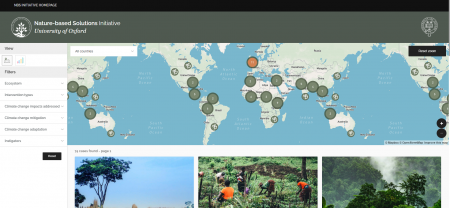New Global Map of best-practice Nature-based Solutions launches at COP26

Our new interactive global map of best practice examples of nature-based solutions across the world, funded by the British Academy, launched at the COP26 Climate Summit in Glasgow on November 8.
The interactive map links nature-based solutions to climate change adaptation and mitigation outcomes based on a systematic review of the peer-reviewed and grey literature. Case studies can be filtered by a range of parameters including ecosystem, intervention type, climate change impacts and instigators. The platform will continue to grow following today’s launch, with more case studies, with detailed coding and contextual information.
Professor Nathalie Seddon, NbSI Director, said: “This new platform of global best-practice Nature-based Solutions showcase the different ways of working with nature to address societal challenges. The rural case studies encompass a wide range of actions, such as the protection and management of natural ecosystems and the application of nature-based principles to agricultural systems. The studies also highlight what can be achieved with high quality NbS that are underpinned by biodiversity, and designed and implemented with the full engagement and consent of local communities and Indigenous Peoples”
As announced in a press release from the British Academy, the map is released alongside a second platform presenting nature-based solutions in cities. The Urban Nature Atlas profiles in detail over 1,000 projects from European cities and beyond.
To develop this tool we have worked closely with Urban Nature Atlas, and our project partners IIED (Dilys Roe and Ebony Holland), UNEP-WCMC (Val Kapos), BirdLife International (Mel Heath and Rhiannon Niven), University of Aberdeen (Pete Smith), University of Durham (Harriet Bulkeley), and the University of York (Robert Marchant).
Alongside the digital maps, the British Academy has published two briefings exploring the role of nature-based solutions:
- “Valuing Inclusion and Diversity, Embracing Uncertainty: Ways Forward for Nature-Based Solutions” – by Dr Linjun Xie – examines the multiple benefits of nature-based solutions beyond climate mitigation and adaptation, and outlines the fundamental principles for unlocking the potential of these interventions.
- “Nature-Based Solutions and the Green Economy” – by Dr Leslie Mabon – explores the ways in which nature-based solutions may contribute to a “green economy” and identifies some of the challenges to enacting a green economy through nature-based approaches.
Visit the interactive global NbS map portal and explore the variety of global NbS case studies. If you would like to add your project to the database and you believe it meets the four guidelines for successful NbS (www.nbs guidelines.info), please get in touch.
Visit the interactive global NbS map portaor the BA hub for both platforms, and explore the variety of global NbS case studies. If you would like to add your project to the database and you believe it meets the four guidelines for successful NbS (www.nbs guidelines.info), please get in touch.




